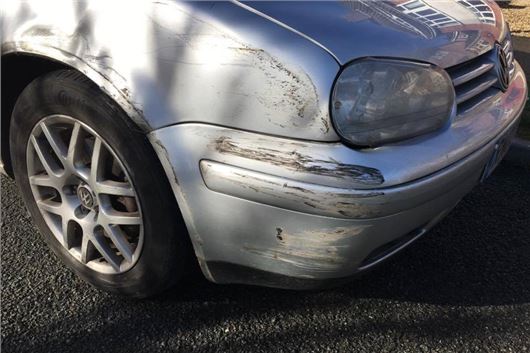Crash for cash schemes cost insurance industry £340 million a year

Crash for cash schemes - where fraudsters stage collisions in order to profit off insurance claims - remain a "real and growing" threat for drivers according to vehicle protection and management technology provider, AX.
Crash for cash schemes are among the most prevalent types of insurance fraud. The Insurance Fraud Bureau (IFB) says the scams cost the industry around £340 million a year.
Data from industry body, Cifas, shows that motor insurance fraud is one of the fastest growing categories of insurance fraud in the UK. Last year, Cifas revealed that fraudulent car collision claims increased 45% year-on-year – well above an average of 27% across all categories of insurance fraud.
"Some criminals have used the Covid-19 pandemic lockdown to plan motor insurance frauds, and they are now intent on cashing in at the expense of innocent motorists," said Director of Investigative Services at AX, Neil Thomas.

Experts, including the ABI (Association of British Insurers) agree there are three main categories of crash for cash schemes: staged collisions , ghost collisions and induced collisions.
In staged collisions, fraudsters intentionally damage vehicles to give the impression that a real crash has occurred. This could involve taking a sledgehammer to a parked car, or even intentionally crashing two vehicles – whatever it takes to fabricate the evidence.
Ghost collisions happen when a someone submits a fictional claim for a collision that never took place. It takes advantage of instances where claims are never fully investigated. Lastly, induced collisions are the most notorious tactic. This is where the scammer drives in an erratic or manipulative way, hoping to engineer crashes that appear legitimate.
>>> One in five disabled parking bays misused at supermarkets
The most reported technique is braking hard while driving in front of another car, causing a rear-end collision. Other common reports include drivers flashing their lights at junctions to let other drivers out - only to crash into them on purpose, and where the fraudster extorts cash from the driver at the roadside rather than through their insurer.
"These scams are often carried out by well organised criminal gangs. If you suspect that you have been a victim, do not put yourself at risk and report your suspicions to the police and your motor insurer immediately", said Malcolm Tarling, spokesperson for the Association of British Insurers (ABI).
Experts recommend the following tips to counteract crash-for-cash schemes:
- Be vigilant. It's often possible to identify cars used in traditional slam-on collisions because they have rear-end damage from previous scams. Also watch out for erratic driving and passengers looking back as they could be waiting to tell the driver when to slam the brakes on.
- When a collision happens, drivers should gather evidence safely at the scene. Note key facts and where possible identify potential witnesses
- Invest in a dash cam and/or telematics. Dash cams record everything while you drive and can be very useful in proving you weren't at fault in case of an accident.

 Georgia Petrie
Georgia Petrie
 Honest John Awards 2017: Land Rover Discovery Sport named Most Popular SUV for second year in a row
Honest John Awards 2017: Land Rover Discovery Sport named Most Popular SUV for second year in a row
 2022 Smart #1 SUV: price, specs and release date
2022 Smart #1 SUV: price, specs and release date
 2023 Ferrari Purosangue SUV: Prices, specs and release date
2023 Ferrari Purosangue SUV: Prices, specs and release date
 Citroen DS3 Racing revealed
Citroen DS3 Racing revealed
 Infiniti adds diesel to the range
Infiniti adds diesel to the range
 Volvo XC90 chosen as SUV of the year at 2014 Honest John Awards
Volvo XC90 chosen as SUV of the year at 2014 Honest John Awards
 March new car registrations better than expected
March new car registrations better than expected





.jpg)






gavsmit on 5 August 2020
My dashcam (front and rear facing) is an essential piece of equipment in these days of so many thieving rats on our roads. But make sure you get a reliable one and not some cheap rubbish that will let you down when you need it.I only hope these rats get what's coming to them via more severe sentencing because they don't care about putting you and your kids in potentially fatal danger just to extort a few quid.
hissingsid on 6 August 2020
Their cars should be confiscated and crushed, preferably with the offenders inside.conman on 8 August 2020
If you have been a victim of these scum, you might be now thinking 'if I just had bought a dashcam' it would have shown up the scams these scum get up to. For under £50 you can get a branded make and it might be the best £50 you have ever spent.A friend of mine who I have been asking to get a dashcam for years finally bought one. Of course after it was too late when a driver smashed into her head on, apologised said it was his fault until she received a letter from her insurance company saying she had caused the accident. Now it's a fight to clear her name.
If you think it's a scam call the Police.
Maxonian on 10 August 2020
Not new. Guy drove out of BP petrol station onto A6 in Loughborough about 15 years ago straight in front of me. I managed to avoid him and he drove away at high speed but the guys in the petrol station told me he’d tried it before.NEIL SCARLETT on 10 August 2020
Bring back hangingNEIL SCARLETT on 10 August 2020
Only Joking, cat of nine tails would better.
Edited by NEIL SCARLETT on 10/08/2020 at 20:28
Phil Norton on 10 August 2020
The photo at the top does not accurately represent a typical insurance scam perpetrator.DLDLDL on 11 August 2020
Is there any experience of:1) Scammers seeing a dashcam and choosing a different victim (deterrent effect)?
2) Scammers after a crash discovering a dashcam and stealing it under threat of violence (provocation effect)?
Answers point to whether or not you want a concealed camera and at what point you reveal its existence.
CanAmSteve on 12 August 2020
Just like the issues with UK benefits being available to those undeserving, this just points out the lack of gov't and industry to join up the dots. There's no reason any multiple claims should ever be allowed, but then, most of the UK police forces don't talk to each other - and neither do the regional CPSesRemember - dashcams are illegal in many EU countries - often not mentioned on HJ
Add a comment